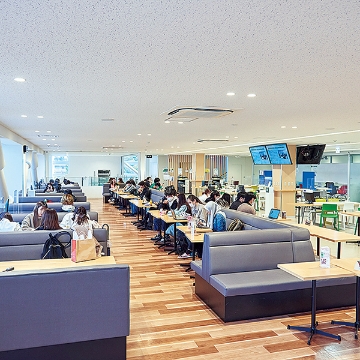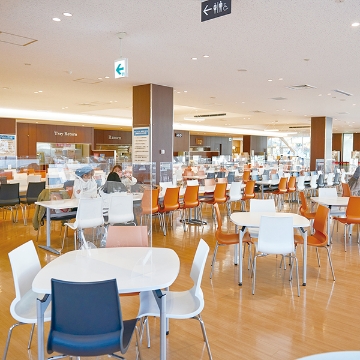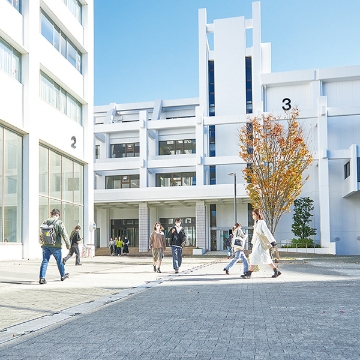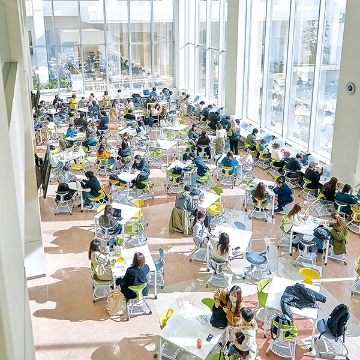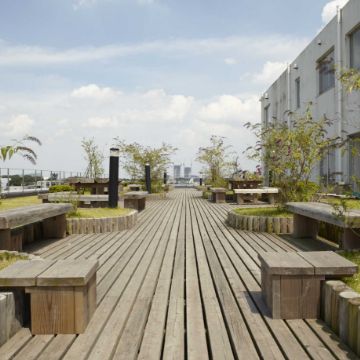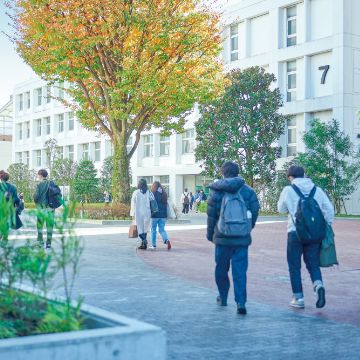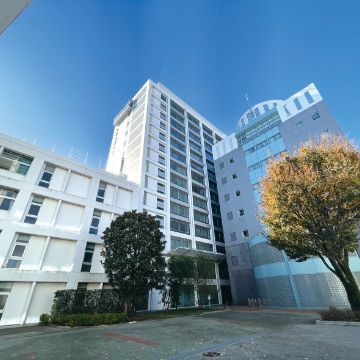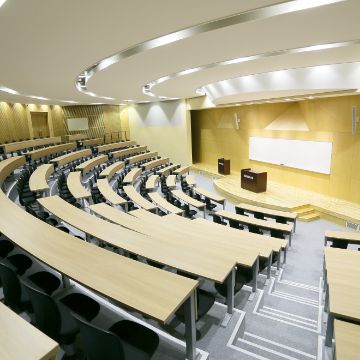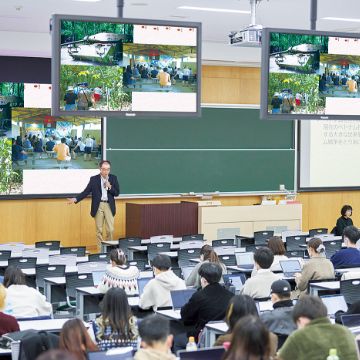社会学部TOP
#F8F6E4
社会学とは?
ゲームもテーマパークもコーヒーも、感染症も格差も、
すべて社会学の対象です。
すべて社会学の対象です。
社会学は人と人とのかかわりに注目します。
人々が作り出す楽しいエンターテインメントがどう発展してきたか。コーヒーを飲みながら商談するような習慣はいかに生まれたのか。感染症や格差が社会をどう変えているか。社会学は身の回りの人間関係から地球レベルの紛争まで、想像力を駆使しながら、人間集団について学び、そこで生じている課題の解決を助ける学問です。
亜細亜大学社会学部では、フィールドワークや課題解決型授業を通して、多様な他者と協力する姿勢を磨き、地域社会のあり方や仕事(ビジネス)、生活、消費について分析し、社会課題の解決を担う実践型人材を育成します。
社会学部現代社会学科
学位:学⼠(社会学)
⼊学定員:145名(収容定員:580名)
入学金・学費:1,355,000円
※入学金230,000円含む
人々が作り出す楽しいエンターテインメントがどう発展してきたか。コーヒーを飲みながら商談するような習慣はいかに生まれたのか。感染症や格差が社会をどう変えているか。社会学は身の回りの人間関係から地球レベルの紛争まで、想像力を駆使しながら、人間集団について学び、そこで生じている課題の解決を助ける学問です。
亜細亜大学社会学部では、フィールドワークや課題解決型授業を通して、多様な他者と協力する姿勢を磨き、地域社会のあり方や仕事(ビジネス)、生活、消費について分析し、社会課題の解決を担う実践型人材を育成します。
社会学部現代社会学科
学位:学⼠(社会学)
⼊学定員:145名(収容定員:580名)
入学金・学費:1,355,000円
※入学金230,000円含む
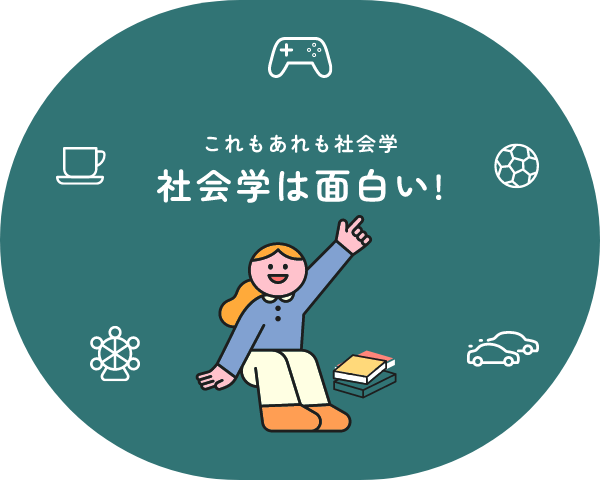
transparent

亜細亜大学社会学部の特長
地域、企業、国内外の現場で
他者と協力して課題解決に
あたることができる人材へ
他者と協力して課題解決に
あたることができる人材へ
社会の多様な現場で協力し合うための
社会人基礎力を身につける
必修のゼミナールでコミュニケーション力をUP!
社会人に必要なプレゼンテーションやディスカッションを行うスキルを磨きます。
PCスキルとプログラミングスキルを修得!
【ゼロから学ぶPCスキル】【ゼロから学ぶプログラミング】を開講します。
キャリア形成関連科目で自分らしい未来へ!
自分を知ることから、業界研究、選考対策まで、就職活動のサポートが充実しています。
留学でグローバルな視野を身につける!
多様性を尊重し、協力し合う姿勢を身につけるために、留学を推奨しています。
亜細亜大学の留学プログラム
社会人に必要なプレゼンテーションやディスカッションを行うスキルを磨きます。
PCスキルとプログラミングスキルを修得!
【ゼロから学ぶPCスキル】【ゼロから学ぶプログラミング】を開講します。
キャリア形成関連科目で自分らしい未来へ!
自分を知ることから、業界研究、選考対策まで、就職活動のサポートが充実しています。
留学でグローバルな視野を身につける!
多様性を尊重し、協力し合う姿勢を身につけるために、留学を推奨しています。
亜細亜大学の留学プログラム
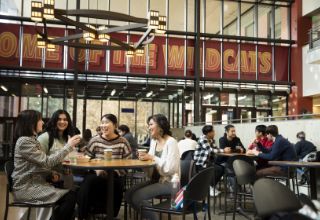
社会学に基づいた
課題解決能力を身につける
社会学を基礎から修得!
社会学の概要と社会調査の基礎を1年次に学修。3年次のゼミナールなどで実践力を磨きます。
視野を広げる多様な科目!
【経営学概論】【ビジネス経済概論】【社会心理学概論】といった科目も多数開講します。
専門性を高める独自の3コース!
エンターテインメントと文化、コミュニティとネットワーク、都市とビジネスの3つのコースから専門知識を深められます。
「PBL( 課題解決型学習)」で課題解決力をUP!
自治体や企業と協働した授業で、実際の生活やビジネスの現場で課題解決に挑みます。
社会学の概要と社会調査の基礎を1年次に学修。3年次のゼミナールなどで実践力を磨きます。
視野を広げる多様な科目!
【経営学概論】【ビジネス経済概論】【社会心理学概論】といった科目も多数開講します。
専門性を高める独自の3コース!
エンターテインメントと文化、コミュニティとネットワーク、都市とビジネスの3つのコースから専門知識を深められます。
「PBL( 課題解決型学習)」で課題解決力をUP!
自治体や企業と協働した授業で、実際の生活やビジネスの現場で課題解決に挑みます。
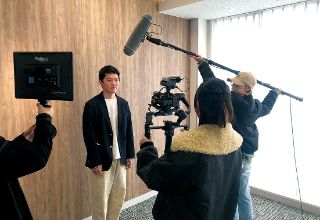
亜細亜大学社会学部はこんな人にお勧め!
好きなものを
とことん追究したい人
とことん追究したい人
好奇心の強い人
インタビューやフィールド
ワークをしてみたい人
ワークをしてみたい人
世の中の仕組みを知って
広い視野を持ちたい人
広い視野を持ちたい人
亜細亜大学だから学べる!学びのポイント
あらゆる現象を研究対象とし
より良い社会を模索する学問
より良い社会を模索する学問
社会は、人と人とがかかわり形成されるもの。身の回りの人間関係から社会現象になったコンテンツ、地球レベルの紛争まで、あらゆる事象が社会学の研究対象になります。社会学や社会調査法の知識は、より良い社会のあり方を模索するための力です。好奇心の赴くままに探究したい、多角的な視野を身につけたいなどと考える学生におすすめです。
現場志向・課題解決型の教育で
実践力を身につけるカリキュラム
実践力を身につけるカリキュラム
基礎から順に社会学を修得し、関心のあるテーマについて専門知識と探究を進められる3コースを設定しています。学んだ知識を活用して、自分なりに課題解決をめざす授業では、実践力が身につきます。また、近隣の武蔵野市や三鷹市と連携した授業など、キャンパスを飛び出して社会のリアルを学ぶ科目も多数開講されます。
亜細亜大学ならではの
「エンターテインメントと文化」コース
「エンターテインメントと文化」コース
3コースの中でも、アニメやアート、テーマパークなど、エンターテインメントと文化を真正面から捉え、社会との関連性を探究するコースは、亜細亜大学ならでは。ゲーム制作会社などのエンターテインメント関連企業で活躍していた教員が在籍しており、学生の学びを支えます。
#A9E9F2
専門性を高める3つのコース
コース1
エンターテインメントと文化
カルチャーや消費社会を考える!
ゲーム、テーマパーク、アートなど、世間で人気なコンテンツは「社会の鏡」です。エンターテインメントと文化を通して社会のあり方を読み解き、より良い世界をつくるためにどのようなアプローチができるかを考察します。
開講予定科目
消費社会論/遊びの社会学/サブカルチャー論Ⅰ・Ⅱ/ゲーム産業論/クリエイティブ産業論/テーマパークの社会学/消費者行動論/コンテンツ産業論/アートと社会
消費社会論/遊びの社会学/サブカルチャー論Ⅰ・Ⅱ/ゲーム産業論/クリエイティブ産業論/テーマパークの社会学/消費者行動論/コンテンツ産業論/アートと社会
コース2
コミュニティとネットワーク
つながりや地域社会を考える!
地域や社会における人と人との「つながり」が薄れゆく現代社会。コミュニティや家族のあり方を問い直し、年齢や国籍の異なる人々と共生できる空間や組織のデザインを学び、つながりを再創造する力を養います。
開講予定科目
ソーシャルネットワーク論/街づくり論/異文化コミュニケーション論/家族社会論/NPO・NGO論/地域コミュニティ論/福祉社会論/少子高齢化社会論/都市空間論/共生社会論/組織と社会
ソーシャルネットワーク論/街づくり論/異文化コミュニケーション論/家族社会論/NPO・NGO論/地域コミュニティ論/福祉社会論/少子高齢化社会論/都市空間論/共生社会論/組織と社会
コース3
都市とビジネス
都市計画や産業・金融を考える!
ビジネス、金融、都市開発、スマートシティといったキーワードから「都市」の魅力や課題を検討し、活気や心地よさを高める新たなビジネスを、経営学的な観点から創造するスキルを培います。
開講予定科目
建築デザインと社会/グローバル市場戦略論/会計情報基礎/会計情報概論/アジアの都市と社会/マーケティング論/リスクマネジメント/現代国際金融論/PPP/PFIと都市開発/産業政策と産業構造/イノベーション論/空間デザイン演習/メガシティ論/都市計画論/ファイナンス論/地域産業振興論
建築デザインと社会/グローバル市場戦略論/会計情報基礎/会計情報概論/アジアの都市と社会/マーケティング論/リスクマネジメント/現代国際金融論/PPP/PFIと都市開発/産業政策と産業構造/イノベーション論/空間デザイン演習/メガシティ論/都市計画論/ファイナンス論/地域産業振興論
教員紹介
| 氏名 | 現職 | 専門分野 | キーワード | 出張講義(講演)で可能なテーマ |
| 赤羽 裕 教員情報 | 教授 | 国際金融 | 国際金融、通貨・為替制度、アジア経済、国際金融センター、企業財務 | アジアの通貨・為替制度/企業の為替リスク管理/ASEANにおける金融・資本市場統合/国際金融センター |
| 新井 健一郎 教員情報 | 准教授 | 都市研究、東南アジア研究 | ジャカルタ、都市開発、郊外化 | インドネシアの不動産開発/アジア都市のフィールドワーク |
| 石田 幸生 教員情報 | 准教授 | 社会学 | 現代社会学、社会ネットワーク論、コミュニティ、社会調査法、社会史 | 現代社会における個人間のつながりのあり方を読み解く |
| 岩垣 穂大
教員情報 | 講師 | 地域福祉学、公衆衛生学 | 地域コミュニティ、地域デザイン、地方創生、こども食堂、生活困窮者支援 | 若者の力が生み出す地方創生/社会的処方と健康づくり/地域コミュニティとまちづくり |
| 歸山 亜紀
教員情報 | 准教授
| 社会学 | 社会調査法(survey methodology)、テキスト分析、医療社会学、労働社会学 | 社会調査法/社会学入門 |
| 金 柄式
教員情報 | 講師 | 組織理論、経営戦略論、アントレプレナーシップ/イノベーション | イノベーション、スタートアップ、ソーシャルネットワーク、ステータス/レピュテーション、カテゴリー/アイデンティティ | ソーシャルネットワークと組織マネジメント/アイデンティティと社会経済・組織個人/スタートアップ企業投資の現状とその各国比較 |
| 顧 姍姍 教員情報 | 講師 | 日本文学、中国文学 | 日本漢詩、日中比較文学、奈良時代、平安時代、『懐風藻』、『菅家文草・後集』 | 奈良・平安時代の日本漢詩/日中古代文学の交流/中国文化全般 |
| 後藤 康浩
教員情報 | 教授 | 経営学 | 経営戦略論、経営組織論、国際経営、直接投資 | アジアの経済・産業動向/日本企業のアジア戦略/産業政策と産業構造/デジタライゼーションと国家/リアルとデジタルの相克 |
| サイトウ・アキヒロ
教員情報 | 教授 | メディア情報学、感性情報学、ソフトコンピューティング | ユニバーサルデザイン、アフォーダンス、インターフェイス、ユビキタス、デジタルサイネージ | 「ゲームのノウハウをゲーム以外の分野で応用する」という講義が基本となり、講演実績として、トヨタ自動車や三菱電機、KDDI、ソフトバンクなど日本の企業にとどまらず、TEDやIEEEなど海外団体からの依頼も多い。ゲームニクスに関する著書も多数 |
| 白井 宏昌
教員情報 | 教授 | 建築デザイン、都市デザイン、都市社会学 | 空間デザイン、空間の再生、メガイベントと都市空間 | 建築・都市デザイン/空間の再生/オリンピックと都市 |
| スカウテンアンドリュー
教員情報 | 講師 | 社会基盤(土木・建築・防災)、建築計画、都市計画 | Urban Planning、Transportation Planning、Travel Behavior | 近代社会都市計画課題/交通システム、住宅環境と社会/都市計画政策の分析/研究論文の書き方/研究方法 |
| 高橋 明子
教員情報 | 特任准教授
| 情報社会学、地域情報化 | ユーザ主権、自治体DX、プラットフォーム設計 | ネットワーク社会の可能性/映像制作を通じた自己表現と対話の手法/自治体DXの推進 など |
| 寺島 拓幸 教員情報 | 教授 | 社会学 | 文化、消費、ライフスタイル | サステナブルな消費とはなにか/シェアリングエコノミーにおける利用者の価値観/ソーシャルメディアと見せびらかしの消費 |
| 林 聖子
教員情報 | 教授 | 技術経営(イノベーション) | イノベーション、中小企業のイノベーション創出支援、産学官連携、オープンイノベーション、地域産業振興、人材育成 | イノベーション創出や産学連携による地域産業振興/中小企業のイノベーション創出/オープンイノベーション等連携について/技術経営(MOT)/堀切川モデル 他 |
| 三好 出
教員情報 | 准教授 | 会計学 | 簿記論、簿記教育、経営分析、キャッシュフロー分析、会計情報システム | 会計情報からみた企業行動 |
| 李 立栄
教員情報 | 教授 | 金融、ファイナンス、理論経済学 | 金融制度と金融ビジネス、金融イノベーション(デジタル変革、フィンテック)、中国の金融 | デジタルトランスフォーメーション(DX)と金融サービス/米中のデジタル金融/SDGsと金融サービス/未来の金融の姿(Embedded Finance<埋込型金融>の最先端)/人工知能の活用で金融ビジネスがどのように変わるか/巨大IT企業の金融機関化の影響 |
カリキュラムPDF
 ※クリックすると表が拡大します
※クリックすると表が拡大します#DBEEF9
めざせる進路・資格
学生それぞれがイメージする将来像を形にできるように、
4年一貫で一人ひとりに寄り添う支援をしていきます。
4年一貫で一人ひとりに寄り添う支援をしていきます。
卒業後の進路
| 幅広い業界の企業へ 一般企業 [メーカー、流通、商社、交通・運輸、不動産、金融、IT関連、メディア・出版など] |
| 日本を支える公務員へ 官公庁[国家公務員、地方公務員など] |
| 自分らしい進路へ 起業、大学院進学など |
取得できる資格
| ●図書館司書 ●社会教育主事(任用資格) ●社会教育士 ●社会調査士 ●社会福祉主事(任用資格) |
#FBEFCD
キャンパス
入学から卒業までの4年間、
ワンキャンパス(武蔵野キャンパス)で学びます。
東京都のほぼ中央。都心からも、
埼玉・千葉・横浜方面からも、らくらくアクセス!
ワンキャンパス(武蔵野キャンパス)で学びます。
東京都のほぼ中央。都心からも、
埼玉・千葉・横浜方面からも、らくらくアクセス!
亜細亜大学は、東西に長い東京都のほぼ中央に位置しており、交通の便にも恵まれています。東西・南北ともに多くの路線が走っており、東京周辺の主な駅からも所要時間1時間から1時間半ほどでアクセスできます。
#FAE5E4
教育研究上の目的
養成する人材像と3つのポリシー
養成する人材像
社会学部現代社会学科は、社会学の知見と学問手法を基軸としつつ、他の社会諸科学の学問知識も生かしながら、現代社会の諸課題とその分析方法を学び、多様性の尊重と寛容の精神をもって、地域、企業、世界の現場で他者と協力して問題解決にあたることのできる人材を育成する。
社会学部現代社会学科は、社会学の知見と学問手法を基軸としつつ、他の社会諸科学の学問知識も生かしながら、現代社会の諸課題とその分析方法を学び、多様性の尊重と寛容の精神をもって、地域、企業、世界の現場で他者と協力して問題解決にあたることのできる人材を育成する。
全て開く
- 卒業認定・学位授与の方針(ディプロマ・ポリシー)
-
社会学部現代社会学科(以下「本学科」という。)は、建学の精神「自助協力」を体得し、学部が定める卒業要件を満たし、現代社会の課題解決に関する専門知識・技能を修得し、次のような能力・資質を備えた人物に学位「学士(社会学)」を授与する。
- 社会学及び社会調査の知識を十分に修得している。
- グローバルな視点をもって、より広範に現代社会を理解し、その課題解決の基礎となる、社会諸科学の基礎知識を修得している。
- ICT活用のための基本スキルを備えている。
- 他者と協力して、より良い現代社会の創出に能動的に貢献できる。
- 目標を定め、自らのキャリアを体験的に形成し、生涯にわたって学ぶ姿勢を持続できる。
- 教育課程編成・実施の方針(カリキュラム・ポリシー)
-
本学科では、ディプロマ・ポリシーに挙げた知識・技能・態度を修得させるために、以下のような方針に基づき、教育課程を編成し、実施する。
【教育内容】- まず1年次に「社会学入門」及び「社会調査入門」を必修としておき、2年次以降においても社会学関連科目を多数配置する。
- より広範な学問知識を身に着けるために、1年次に「ビジネス経済概論」をおき、2年次に「社会心理学概論」及び「経営学概論」などをおき、それ以降に展開科目を配置する。
- ICT活用のための基本スキルを修得するために、「ゼロから学ぶPCスキル」及び「ゼロから学ぶプログラミング」をおき、その展開科目も一定程度履修可能とする。
- 現代社会の諸課題を実際的に学ぶために、「エンターテインメントと文化」「コミュニティとネットワーク」及び「都市とビジネス」の3つの研究コースを編成し、体系的な学修機会を提供する。
- 他者と協力し、同時に生涯にわたって学ぶ姿勢を身に着けるために、1年次に初年次ゼミナール(本学科では「基礎ゼミナールⅠ・Ⅱ」)、3・4年次に「卒業研究ゼミナールⅠ~Ⅳ」を必修として配置し、あわせてキャリア形成関連科目の履修を可能とする。
- 入学者受入れの方針(アドミッション・ポリシー)
-
本学科では、現代社会の諸課題に積極的に取り組み、その解決を図るという観点から、ディプロマ・ポリシーに示した知識・技能・態度を持つ人材を育成するために、次に掲げるような人が広く国内外から入学することを期待している。
- 現代社会学科での教育内容が理解できるように、高等学校の教育課程において基礎的な知識・技能を修得している。
- 現代社会について深い関心を持ち、多様な価値観を持つ人々と協働する積極性と、異なる意見に耳を傾ける柔軟性を有している。
- 現代社会学科で学ぶ4年間で、知識を豊かにし、自らの見識やスキルを向上させようという意欲を持っている。
- 現代社会の諸課題解決のために、現代社会学科で学ぶ知識・技能・態度を活かしたいと考えている。
#ffffff
社会学部NOW!
社会学部の今を見る

